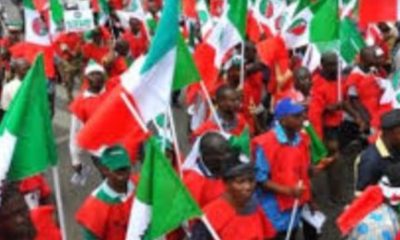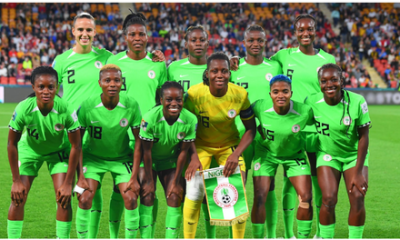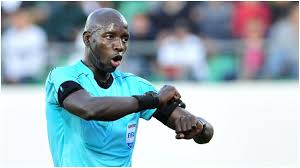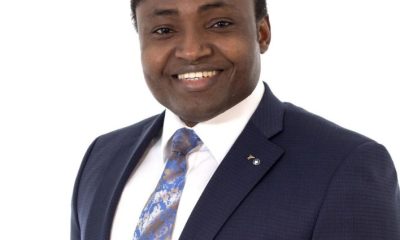National
Nigeria Officials Received ₦721bn Bribes Just in 2023 – UN Report

A newly released report by the Nigerian Bureau of Statistics (NBS) in collaboration with the United Nations Office on Drugs and Crimes (UNODC), has said Nigerian public officials received nothing less than ₦721bn as bribes in 2023.
The result was based on a survey conducted with the UNODC.
According to the report “Corruption in Nigeria: Patterns and Trends”, published by the NBS on Thursday, the ₦721bn paid in bribes amounted to about 0.35 per cent of Nigeria’s Gross Domestic Product (GDP).
According to the survey, the average cash bribe was ₦8,284, an increase from an average of ₦5,754 in 2019.
“According to the 2023 survey, the average cash bribe paid was 8,284 Nigerian Naira. While the nominal average cash bribe size increased since 2019 (from NGN 5,754), this does not account for inflation. The inflation-adjusted average cash bribe in 2023 was 29 per cent smaller than in 2019 in terms of what could be bought with the money.
“Overall, it is estimated that a total of roughly NGN 721 billion (US$1.26 billion) was paid in cash bribes to public officials in Nigeria in 2023, corresponding to 0.35 per cent of the entire Gross Domestic Product of Nigeria,” the report read in part.
The report indicates that 56 per cent of Nigerians interacted with a public official in 2023, down from 63 per cent in 2019.
Despite this reduction, bribery remains widespread, with an average of 5.1 bribes paid per bribe payer, totalling approximately 87 million bribes nationwide. This is a decrease from the 117 million bribes estimated in 2019.
On payment mode, the report noted that over 95 per cent of bribes were paid in monetary form (cash or money transfer) in 2023.
It said public officials were more likely to demand bribes while private sector actors included doctors in private hospitals, which increased from 6 per cent in 2019 to 14 per cent in 2023.
Despite this rise, bribery in the public sector remains about twice as high, with public sector contact rates also being twice as high as those in the private sector.
In 2023, 27 per cent of Nigerians who interacted with a public official paid a bribe, a slight decrease from 29 per cent in 2019. Including instances where bribes were requested but refused, over one-third of interactions between citizens and public officials involved bribery.
Similarly, the report shows a growing trend of Nigerians refusing to pay bribes. In 2023, 70 per cent of those asked to pay a bribe refused at least once, with the highest refusal rates in the North-West zone at 76 per cent. All regions recorded refusal rates above 60 per cent. This indicates that Nigerians are increasingly standing against corruption.
According to the report, bribery is becoming less accepted in Nigeria. The percentage of citizens who view bribery requests as acceptable to expedite administrative procedures decreased from 29 per cent in 2019 to 23 per cent in 2023.
Fewer citizens reported suffering negative consequences after refusing bribe requests in 2023 compared to 2019. This suggests a growing empowerment among Nigerians to confront corrupt officials without fear of repercussions.
In 2023, 21 per cent of bribe refusers indicated they refused because they had other options. Normative concerns (42 per cent) and cost of living pressures (23 per cent) also played significant roles in their refusal to pay bribes.
Furthermore, not less than 60 per cent of public sector workers were hired due to nepotism, bribery or both between 2020 and 2023.
The report noted that six out of 10 successful candidates admitted to using either nepotism, bribery, or both to improve their chances of being recruited.
Specifically, 27 per cent of these candidates admitted to using only bribery, 13 per cent to only nepotism, and 19 per cent to both bribery and nepotism. On the other hand, 40 per cent of the candidates claimed to have secured their positions without resorting to any such means, based on data collected between November 2020 and October 2023.
The report read, “The selection process used to recruit public officials plays a crucial role in shaping the culture of integrity that should drive the civil service as well as ensure that recruits have the highest standards of professionalism and merit.
However, the 2023 survey findings indicate that the public sector recruitment process requires closer monitoring, as almost half (46 per cent) of people who secured a job in the public sector in the last three years before the survey admitted that they paid a bribe to facilitate their recruitment – about 1.5 times the share found in the 2019 survey (31 per cent).
“The 2023 survey also found evidence that a considerable number of people recruited into the public sector secured their posts with the help of a friend or relative, many in addition to paying a bribe: of all successful applicants in the last three years before the 2023 survey, 32 per cent were helped by friends or relatives. Overall, in the three years before the 2023 survey, around 60 per cent of public sector applicants in Nigeria were hired as a result of nepotism, bribery or both – about 1.2 times the share found in the 2019 survey.”
The report also noted that the use of bribery is notably lower when the recruitment process includes formal assessments.
Specifically, 51 per cent of candidates were not formally assessed, and of these, a significant 53 per cent admitted to using bribery or nepotism to secure their positions.
Conversely, among the 49 per cent of candidates who underwent a written test or oral interview, the use of unethical means such as bribery or nepotism dropped to 41 per cent.
The report read: “The 2023 survey data show that approximately half (49 per cent) of those who secured a position in the public sector in the three years before the survey passed a written test and/or oral interview during the recruitment selection process. Importantly, the data suggest that the means of selection had a role in facilitating or preventing the use of illegal practices during recruitment. Among those who underwent an assessment procedure (written test / oral interview), 41 per cent made use of bribery, while the share was as much as 53 per cent among those who were not formally assessed.”
It was also disclosed that bribery is more common in rural areas, with rural residents paying an average of 5.8 bribes compared to 4.5 bribes in urban areas.
It was also disclosed that bribery is more common in rural areas, with rural residents paying an average of 5.8 bribes compared to 4.5 bribes in urban areas.
The report stated that corruption was ranked fourth among the most important problems affecting the country in 2023, after the cost of living, insecurity and unemployment.
It added, “This suggests relatively stable and high levels of concerns about corruption over time and compared to other concerns such as education or housing.
“Nigerians confidence in the government’s anti-corruption effort has been declining over time and across regions. While in 2019, more than half of all citizens thought that the government was effective in fighting corruption, in 2023, the share declined to lessons than a third of all citizens.
“The downward trend in the citizen’s confidence is observable across the entire country, with all six zones recording reductions of more than 10 percentage points between 2019 and 2023 in terms of the share of citizens who thought the government was effective in fighting corruption.”
You may like
-
Ruud van Nistelrooy Opens Up on Hurtful Manchester United Exit Before Taking Leicester City Job
-
Why I don’t trust any public institution in Nigeria – Fisayo Soyombo
-
Minimum Wage: Cross Rivers Workers to embark on indefinite strike
-
Bayer Leverkusen Forward Victor Boniface Faces Possible Sanction for Reckless Driving Incident
-
International Friendly: Gusau, Sanusi, Falode to cheer Super Falcons against Les Bleues
-
Ancelotti Optimistic Despite Real Madrid’s Struggles in Champions League League
-
Paul Merson Predicts Premier League Results for Weekend Fixtures
-
Naira Appreciates Against Dollar Amid Increased FX Supply
-
8th African Nations Championship: Togolese, Moroccan officials for Nigeria, Ghana matches
-
Super Eagles Drop Eight Places in Latest FIFA Rankings
-
Tinubu Makes Historic State Visit to France as Macron Seeks Closer Economic Ties with Nigeria
-
Simon Ekpa’s Legal Troubles Deepen as Finnish Court Sets Date for Terror Charges
National
ASUU decries number of first-class graduates from private universities

The Academic Staff Union of Universities (ASUU) has frowned at the “increasing numbers of first-class graduates” churned out annually by private universities in the country.
The ASUU National President, Prof. Emmanuel Osodeke, raised the concern on Thursday at an event organised by the body in honour of Prof. Andy Egwunyenga’s successful tenure as Vice Chancellor of Delta State University (DELSU).
The event took place at the DELSU campus, Abraka, Ethiope East Local Government Area of Delta.
Osodeke said that if public universities adopt the same practice without regulation, it could lead to the decline of genuine academic pursuits.
According to him, primary and secondary schools nowadays are producing graduates with excellent grades with insufficient knowledge.
The union leader also decried what he called “the mass exodus” of skilled Nigerian workers to nations perceived to be offering better work and living conditions.
He said that incidents like building collapse in the country indicated there were significant issues within the nation’s institutions.
“The struggle for academics to enjoy a decent standard of living saw some measure of successes in the past when academics could sustain a comfortable life.
“The situation has changed; the unions must return to the frontline for a renewed phase of their struggle.
“ASUU will consistently speak out against injustices and support fairness,” he said.
A member of the union, Prof. Omotoye Olorode, spoke on the topic: “New University Curricula (CCMAS): Context and Matters Arising” .
He said that the CCMAS functioned as an imperialistic mechanism aimed at disrupting the established academic structures in the country’s universities.
Olorode said this was designed to perpetuate a system, where Africans remain agricultural labourers to support the agricultural needs of developed nations.
“UNESCO recommends that 26 per cent of the nation’s budget should be allocated to education.
“Nigeria has never reached more than seven per cent, which reflects our stagnation and reluctance to facilitate growth in the education sector,” he said.
He congratulated the outgoing DELSU vice chancellor on a job well done.
The Chairman of DELSU ASUU, Dr Paul Opone, extended his heartfelt wishes to Egwunyenga.
He said that DELSU had been in dire need of a leader since 2019 to navigate the troubled waters caused by poor leadership.
He praised Egwunyenga for meeting the expectations of ASUU and the university community which, according to him, resulted in widespread celebration across all sectors of the institution.
“This is the first occasion where ASUU had to honour a lecturer at DELSU with such a celebration.
“Prof. Egwunyenga deserves far more than the praises he has received,” he said.
Responding, Egwunyenga expressed joy over the numerous accolades he received from across the three senatorial districts of the state.
He disclosed that his approach as vice chancellor was influenced by the narratives found in Festus Iyayi’s book, “Demons and Monsters”.
National
State police risky, expensive—Cattle breeders

The Kulen Allah Cattle Rearers Association of Nigeria ( KACRAN) has described the proposed state police as too expensive and risky to implement.
Alhaji Khalil Bello, KACRAN National President, said this in a statement in Damaturu on Friday.
He said the cost of establishing state police, depending on a state’s population, was between N10 billion to N30 billion, while monthly salaries and operational costs would gulp about N3 billion.
“These expenditures could divert critical resources from essential public services such as education, healthcare, and infrastructure, which are vital for the development and well-being of the region,” he said.
Bello said there were also concerns over abuse of state police by the politicians.
“There is a risk that these forces could be used to serve the interests of local political leaders rather than the broader public, leading to the victimisation of opposition parties and creating an environment of lawlessness and anarchy.
“Such a scenario could undermine the rule of law and erode public trust in law enforcement,” he said.
He recommended redirecting resources toward initiatives that would promote sustainable development and long-term prosperity for the country.
Bello listed the initiatives as including agriculture investment, youth employment, and industrial and infrastructure development.
The president also proposed the establishment of a security foundation fund in which monthly donation would be made to support the police.
“KACRAN calls on the Arewa Consultative Forum, the Northern Consultative Forum, emirs, and all northern leaders to oppose the establishment of state police.
“We believe that focusing on social services and economic development will yield greater benefits for the region than the creation of state police, which may ultimately exacerbate existing challenges.
“ By investing in sustainable initiatives, Northern states can create a more secure, prosperous, and harmonious society for all citizens,” he said.
National
Gov Okpebholo Suspends Recruitment Into State Civil Service

Edo State Governor, Senator Monday Okpebholo, has approved the suspension of recruitment into the state’s civil service until further notice.
The Governor has also ordered for a comprehensive review of all recruitment exercises carried out by the Godwin Obaseki-led administration between May-November 2024.
In a communication notice signed by the Secretary to State Government (SSG), Musa Umar Ikhilor on Friday, the Governor accused heads of various Ministries, Departments and Agencies (MDAs) of carrying out clandestine recruitment exercises into the State’s civil service.
The notice read: “The Governor of Edo State, His Excellency, Senator Monday Okpebholo is in receipt of report of the clandestine activities being perpetuated by some Commissions, Boards, Parastatals and Agencies of Government in the State.
“Preliminary investigation reveals that these bodies have continued to issue back dated letters of employment to their cronies without due process.
“For the avoidance of doubt, this Administration believes in the principle of fairness and equity which expects that all employment exercise should be merit based, competitive and accessible to all Edo indigenes.
“In light of the foregoing and in order to arrest this ugly trend, the Governor of Edo State, His Excellency, Senator Monday Okpebholo has directed the immediate suspension of all employment processes as well as the review of all appointments carried out since May, 2024 by Commissions, Boards, Parastatals and Agencies of Government.
“Heads of Ministries, Departments and Agencies are to note and comply with the above directive.”
Signed:
Fred Itua,
Chief Press Secretary to Edo State Governor
National
We’ll reintroduce rejected bills on 6-year single term—34 Rep. members

The 34 House of Representatives members who sponsored the bill to amend the 1999 Constitution to provide for a six-year single term for the president have resolved to reintroduce the bill.
Rep. Ikenga Ugochinyere (PDP-Imo) said this in a statement in Abuja on Friday, following the rejection of the bill on Nov. 21 during plenary.
The News Agency of Nigeria (NAN) reports that the bill sought the introduction of a six-year single term for the president, governors and local government chairmen.
NAN also reports that the bill sought zonal rotation of presidential and governorship seats, as well as holding all elections in one day.
Ugochinyere, however, said that all hope was not lost on the bill, as more consultations would be done.
The lawmaker, who is the lead sponsor of the bill, said that the decision on the floor of the house would not put an end to agitation and hope, insisting that the objective behind the bill would be realised.
“The struggle to reform our constitutional democracy to be all-inclusive and provide an avenue for justice, equity and fairness has not been lost.
“The decision on the floor of the house yesterday (Thursday) not to allow the bill for six-year single tenure and all elections to hold in one day will not end the agitation,” he said.
Ugochinyere described the rejection of the bill as a temporary setback that would not affect the campaign for an all-inclusive democratic process.
“We are going to review this decision and find possible ways of reintroducing it after, following due legislative procedures.
“All I can tell Nigerians is that we will continue the advocacy and convince our colleagues to see reason with us.
“If elections are held in one day, it will reduce cost and rigging.
“If power rotates, it will help de-escalate political tensions and six-year single term will go a long way in helping elective leaders to focus on delivering their democratic mandate,” he said.
National
Delta approves N713m for 2024 students bursary payment — Official

Gov. Sheriff Oborevwori of Delta has approved the sum of N713 million for the 2024 bursary award for 32,028 students in tertiary institutions in the country.
The Executive Secretary of the State Bursary and Scholarship Board, Dr. Godfrey Enita, disclosed this in a statement made available to newsmen on Thursday in Asaba.
According to Enita, the governor’s approval for the year 2024, the bursary award will cover students of state origin in public and private universities.
“It also covers students in polytechnics, mono-technics, colleges of education, schools of nursing science, and other tertiary schools, including military and paramilitary institutions.
He described the governor’s gesture as rare and uncommon and should be applauded.
“The governor demonstrates his magnanimity and goodwill towards the well-being of the Delta students and youths in general.
“It also underscores his commitment towards educational advancement through financial assistance to students in diverse forms and through massive infrastructural development in schools across the state.
“It is hoped, as always, that beneficiaries of the state’s financial assistance schemes will continue to be worthy ambassadors of Delta wherever they find themselves,” he said.
National
Survey shows 71% of households affected by food price hike

A new survey report just released by the National Bureau of Statistics (NBS) shows that the most prevalent shock affecting 71 per cent of households in Nigeria is price increases on major food items in the last 12 months.
The survey, 2023/24 General Household Survey-Panel, commonly called (GHS-Panel) Wave-5, is a follow-up to the 2018/2019 GHS Wave-4.
It seeks to enhance the understanding of household living conditions and provide government and other policymakers with reliable information for effective policy decision-making in Nigeria.
It specifically collects information on household income, assets and consumption, income-generating activities, health, education as well as shocks.
The survey conducted in collaboration with the World Bank and released yesterday in Abuja said 48.8 per cent of households surveyed reported that their main mechanism for coping with the increase in the prices of food items was reducing food consumption.
The report further said that 65.8 per cent of the households indicated being unable to eat healthy, nutritious or preferred foods because of lack of money.
The report also shows that 73.0 per cent of survey household members ages 10 to 19 were enrolled in school during 2018/2019 Wave 4 survey. But by 2023/2024 Wave 5 survey, the proportion of the people who were in school had decreased to 44.8 per cent, as 34.8 per cent of those previously enrolled were now out of school.
In the area of energy access, the survey shows that only 40.4 percent of households in rural areas had access to electricity compared to 82.2 per cent of urban households.
It also reports that many households lack toilet facilities and rely on tube wells or boreholes for drinking water. It noted that waste disposal is mostly informal, with 45.6 per cent using bushes or streets.
In his address during the launch of the report, the Statistician General of the Federation (SGF), Prince Adeyemi Adeniran, said the survey is a multi-topic data collection exercise that serves as an essential tool for capturing the dynamics of Nigerian households, providing invaluable insights into their economic activities, well-being, and resilience.
He said it is a longitudinal survey, meaning that it tracks and interviews the same respondents over time. “In the 5th Wave of the survey, approximately the same 5000 households have been followed and interviewed across five waves,” he said.
“This includes Wave One conducted in 2010/11, Wave Two in 2012/13, Wave Three in 2015/16, Wave Four in 2018/19, and now Wave Five conducted in 2023/24.”
He said available records indicate that, over the last five years, the survey findings have been used to design several projects and intervention programmes worth approximately $8.9 billion across many sectors which include Agriculture and Food, Education, Water, Social Protection and Jobs, Governance, and several others.
In his goodwill message, the World Bank’s Country Director for Nigeria, Dr Ndiame Diop, said the survey was important in understanding how Nigerian households responded to policy changes, crises and shocks.
Diop, who was represented by Vinay Vutukuru, Programme Leader, Sustainable Development, Nigeria, however, said the key thing was how the data would be used by ministries and stakeholders for effective policy formulation to achieve economic and sustainable growth.
He pledged the bank’s continuous support in working with the NBS to strengthen Nigeria’s statistical system.

2025: How To Plan A Budget For The Upcoming Year

Ruud van Nistelrooy Opens Up on Hurtful Manchester United Exit Before Taking Leicester City Job

Obasanjo would have died under Abacha if not for me -Gowon

Why I don’t trust any public institution in Nigeria – Fisayo Soyombo

Minimum Wage: Cross Rivers Workers to embark on indefinite strike

Bayer Leverkusen Forward Victor Boniface Faces Possible Sanction for Reckless Driving Incident

Radda approves N70,000 minimum wage for Katsina workers

PH refinery has not commenced bulk sales – NNPC

CBN issues Dec. 1, ultimatum against banks, ATM delays




















